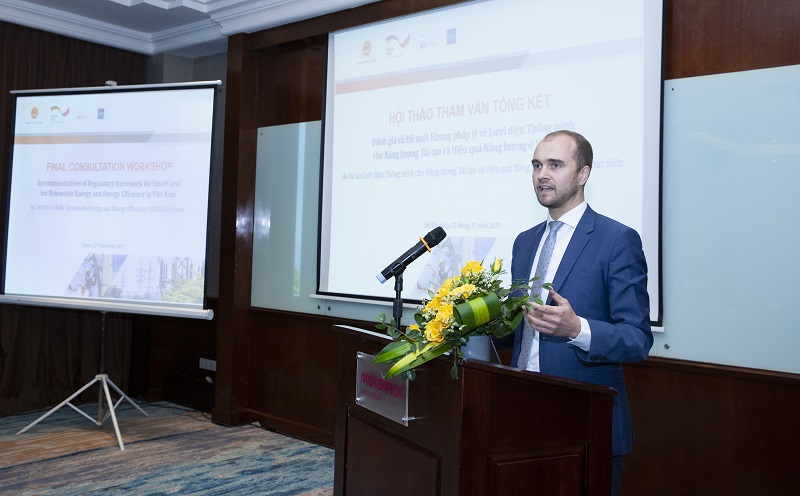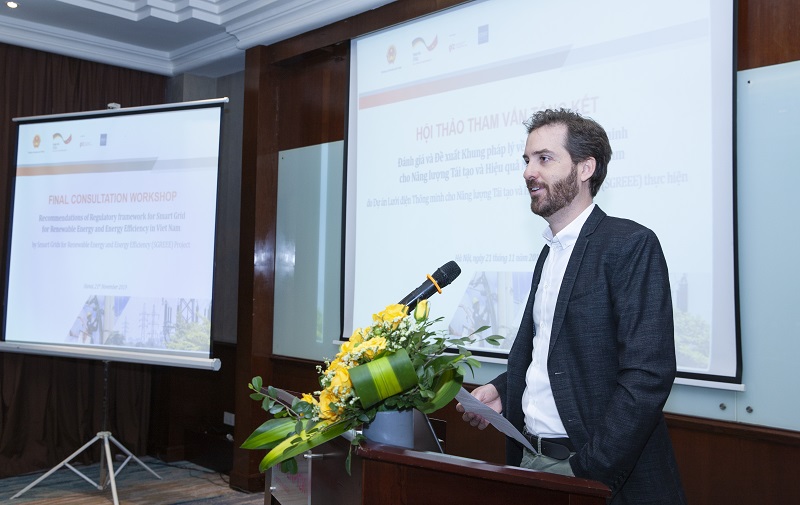Vietnam needs clear policies to promote renewable energy development: Int’l experts
Clear polices would greatly help provide a vision with specific targets of renewable energy for both authorities and investors in the road map ahead.
Vietnam should make clear policies to advance the development of renewable energy amid growing power demand, according to a group of experts in the Deutsche Gesellschaft für Internationale Zusammenarbeit (GIZ) GmbH-supported smart grid project.
| Dr. Werner Friedl at AIT Austrian Institute of Technology. Photo: GIZ |
A policy to promote renewable energy on the part of electricity users has not been given due attention in the course of energy transition and the government needs to improve regulatory framework for the application of smart grid, according to Dr. Werner Friedl at AIT Austrian Institute of Technology.
Power purchase agreements (PPAs), which are currently limited to signing with only one buyer – Vietnam Electricity (EVN), and Direct Power Purchase Agreements (DPPAs), which allow power plants to sell renewable-based generated electricity directly to large power consumers, are just at the planning stage of pilot implementation, the international expert said at the event held in Hanoi earlier this week.
In addition, the approval of a large proportion of renewable energy sources mainly focuses on certain territories and is not synchronized with the current situation and progress of investment in electricity transmission grids while the existing FIT pricing mechanism does not follow the market price signal.
Gaps remain in regulations on integration of renewable energy sources; regulations to implement smart energy technologies; and technical standards for smart energy technology, technical regulations and grid connection standards, Werner Friedl pointed out said at the Final Consultation Workshop on Assessment and Recommendation of Legal Framework for Smart Grid Application to Promote Renewable Energies and Energy Efficiency in Vietnam.
| Tobias Cossen, Project Director at GIZ. Photo: GIZ |
Tobias Cossen, Project Director at GIZ, said, “Vietnam’s electricity system is facing technical and financial challenges as we have seen the country’s rapid development of renewable energy sources in the past year and its ambitious plan until 2030, especially the power sources using wind and solar energy which rely on weather conditions. Therefore, it is necessary to timely develop appropriate legal provisions to enable the high-rate integration of power sources using renewable energy, without affecting the reliability of electricity supply and the quality of the electricity system, as well as to minimize the effect on the average electricity price of the whole system.”
Accordingly, Werner Friedl made some key recommendations, including (i) attractive financial mechanisms to attract renewable energy power plants to participate in the energy balance and ancillary service market; (ii) specific regulations and mechanisms to control grid congestion, limiting curtailment of renewable energy sources in line with the trend of integrating high proportion of renewable energy; (iii) regulations and mechanisms to encourage the installation of an energy storage system and to allow the participation of auxiliary service providers to increase the flexibility and reliability of the electricity system.
Other suggestions are appropriate financial mechanisms to implement the Demand Response Program (DR) and attractive financial regulations and mechanisms to enable the realization of the virtual power plant (VPP) model.
Smart Grids for Renewable Energy and Energy Efficiency (SGREE) is a four-year project beginning in 2017 receiving support from GIZ.
Funded by the German Federal Ministry for Economic Cooperation and Development (BMZ), the Vietnamese Ministry of Industry and Trade’s Electricity Regulatory Authority of Vietnam (ERAV) is the implementing agency for the project which costs EUR5 million (US$5.5 million).














